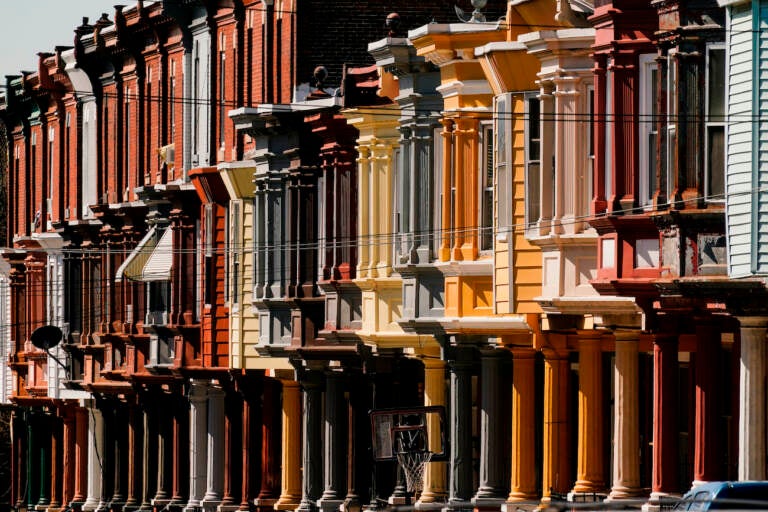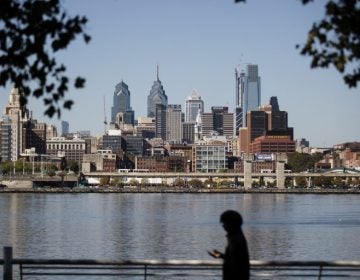Philly City Council considering measures to ease impact of new property assessments
Values for residential properties went up by an average of 31% compared to the last assessments in 2019, burdening homeowners across the city.

Shown are rowhouses in Philadelphia, Friday, April 8, 2022. (AP Photo/Matt Rourke)
Philadelphia City Council is weighing a trio of bills designed to offset the financial burden newly released property assessments are expected to put on thousands of homeowners in the form of increased property taxes.
As expected, Mayor Jim Kenney’s administration on Thursday introduced two relief measures that would expand a pair of existing city programs — the Homestead Exemption and the Longtime Owner Occupants Program (LOOP).
For now, most homeowners can have the assessed value of their property reduced by $45,000. For many, that translates to more than $600 a year in savings on their real estate tax bill. And once the city approves the application, homeowners never need to reapply for the exemption, as long as they continue to own and live on the property.
Under the administration’s bill, property owners could apply for a $65,000 reduction starting with tax year 2023.
The administration wants to increase the total amount of funding available through LOOP from $25 million to $30 million, also starting with tax year 2023.
The program locks in property values for certain homeowners, particularly those living in rapidly gentrifying neighborhoods. If approved, a homeowner’s reassessment value is capped at 150% of the previous year’s value. For example, if a home was assessed at $100,000 in 2022, the property value in 2023 could not exceed $150,000.
To qualify, applicants must:
- Be a homeowner whose primary residence’s assessment increased by 50%
- Have lived in their home for at least 10 years
- Be current with their property taxes, or a participant in an “owner occupied payment agreement” or installment plan
- Have an income that falls below the program’s limits. For a family of four, the income cap is $158,100
The deadline to apply is Feb. 17, 2023. Property taxes are due March, 31, 2023.
Kenney said in an earlier statement that growing property values “reflect well on Philadelphia being a place of choice and represent an opportunity to build wealth for some.” But homeowners deserve protections, Kenney said, adding that he is proposing $200 million in new homeowner and rent relief over five years.
Also on Thursday, City Councilmember Brian O’Neill introduced a bill that would extend the deadline for the Low-income Senior Citizen Real Estate Tax Freeze.
“This legislation will protect senior citizens from property tax increases by giving them the opportunity to have their taxes frozen in place at their current rate before these unprecedented property assessments take effect,” said O’Neill in a statement.
Under the program, eligible applicants must be:
- 65 or older
- Live in the same household with a spouse who is 65 or older
- Be a widow of someone who was at least 65 when they died
Applicants must also meet certain income requirements as individuals or a married couple.
After pausing reassessments for three years, Philadelphia officials on Monday released new property valuations. Residential property values increased by an average of 31% compared to the last reassessment in 2019, a fact that is expected to be the basis for numerous appeals and proposals from lawmakers meant to offset the increases.
According to a review of the reassessments conducted by the City Controller’s Office, property values shot up more than 50% for nearly a quarter of all single-family homes. There are approximately 450,000 single-family homes in Philadelphia.
The review, which includes an interactive map, shows that nearly 10% of single-family homes have assessments that increased by at least 100%. Some increased by 200% or 300%.
Neighborhoods in sections of North, West, and South Philadelphia were hardest hit by the reassessments, according to the review.
Philadelphia delayed doing property reassessments as a result of “issues posed by the pandemic,” according to the city.
WHYY is your source for fact-based, in-depth journalism and information. As a nonprofit organization, we rely on financial support from readers like you. Please give today.









